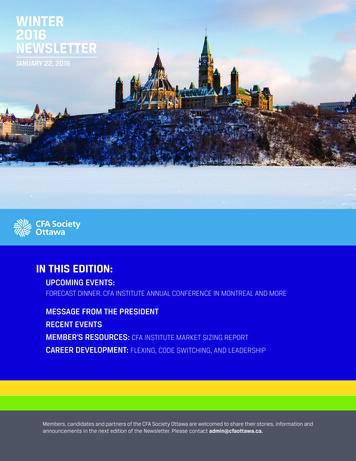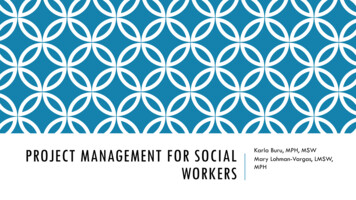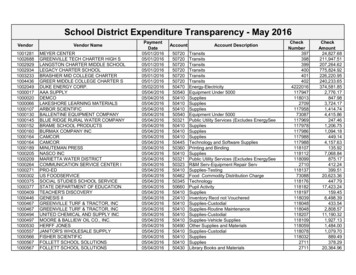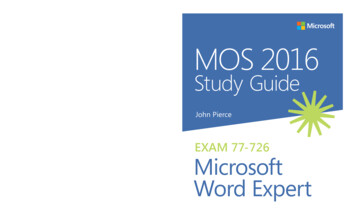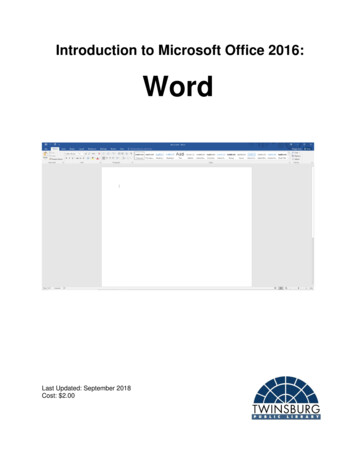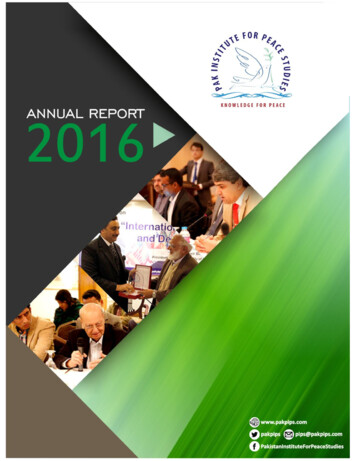
Transcription
PIPS ANNUAL REPORT 2016Pips Annual Report 2016Outline1. Institutional developments .21.1Staff.1.2Capacity building .1.3Internships/fellowships .1.4MoUs and collaborations .Programmatic developments .2.12.22.32.4Counter-Violent Extremism (CVE) .2.1.1Research and analysis .2.1.2Experience sharing and policy advocacy .Education.2.2.1Three (3) two-day dialogue-cum-training workshops with teachers .2.2.2Research and analysis .Interfaith harmony and social cohesion.2.3.1Academic and intellectual dialogue .2.3.2Awareness and advocacy campaign.2.3.3Policy research and recommendations .Internal security .2.4.1 PIPS digital database .2.4.2 Periodic conflict and security reports .2.53Regional security and strategic studies .2.5.1Research and analysis .2.5.2Experience sharing and policy advocacy .2.6Media for peace and democracy .2.7DialoguePublications.Annex-1: PIPS calendar of events (2016).2 Page
PIPS ANNUAL REPORT 20161.INSTITUTIONAL DEVELOPMENTS1.1 StaffTowards the end of 2016, PIPS had nine (9)permanent staff members - graduate andpost-graduate in their respective fields - whoincluded the director research andprogrammes, a research analyst, an editorcum-project administrator, a media andevent coordinator, an administration &accounts officer, an I.T. and web manager,an archivist, and a member of support staff.PIPS also engaged several field researchersand resource persons in different regions ofthe country to carryout different measuresincluding those linked to research andplanned interventions.PIPS Advisory Board members included:Khaled Ahmed (Pakistan); Anatol Liven(UK); Peter Neumann (UK); RubinaSaigol(Pakistan); CatarinaKinnvall (Sweden); andProf. Adam Dolnik (Australia).The members of PIPS staff wereclassifiedinto five (5) broad categories:research and analysis; database, library andresource center; project development andimplantation; publication,training and eventmanagement; and administration andfinance.As in past years, PIPS carried out two typesof staff performance evaluations in 2017:monthly, or assignment-based, processevaluations and an annual summativeevaluation. Staff promotions and incentiveswere basedevaluations.ontheresultsoftheseThe PIPS management team, headed bydirector research, was the main decisionmaking body of the Institute during the year.1.2 Capacity buildingThe Institute encouraged and facilitated al events including on trainingand capacity building. For instance, twomembers of PIPS staff, Hazrat Bilal andNawaf Khan, participated in a one weektraining workshop held in Malaysia inAugust 2016.At the same time, PIPS continued to rely oninternal organizational mechanisms, setforth in PIPS Manual of Procedures, toenhance the capacity of its staff and thequality of output. That included in-housesessions, internal skills analysis andassignment of tasks, and joint assignmentsby senior and junior members.PIPS also encouraged and sponsoredparticipation of its staff members in differentnational and international seminars andconferences held in 2016on the themesrelevant to PIPS mandated areas.1.3 Internships/fellowships3 Page
PIPS ANNUAL REPORT 2016MsHafsaDurrani, a law graduate of theBA/LL.B (Hons.) at Lahore University ofManagement Sciences (LUMS) completedher about two months internship with PIPSfrom December 6, 2016 to January 31, 2017.1.4 MoUsand collaborationsSince its inception in 2005, PIPS has been ina continuous process of developing formaland informal linkages and collaborationswith research and academic institutions thathave a common thematic focus. TheInstitute has entered into collaborations andsigned memoranda of understanding withvarious organizations and institutions acrossthe globe in one or more of the followingareas. Joint publications; Capacity building initiatives andmutual internships; Exchangeofscholarsandfellowships; Research collaborations; Holding of joint events such asconferences and seminars, etc.; Exchange of periodic and otherpublications; and Regularconsultationswithorganizations and institutions with acommon thematic focus in order toshare experiences on research, policyadvocacy and other programmaticareas.4 Page
2.PROGRAMMATIC DEVELOPMENTSThe Institute implemented a range ofmeasures including research and analysesand other planned activities, as describedlater in the report, in the following sevenmajor areas in the year 2016: Counter-Violent ExtremismEducationInterfaith harmony and co-existenceInternal securityRegional security and strategicstudiesMedia for peace and democracyDialogue2.1 Counter-Violent Extremism (CVE)Pak Institute for Peace Studies implementeddiverse CVE measures, which were linkedto these three larger components: i) conductempirical and theoretical research onreligious extremism, radicalization and theconcomitant phenomena; ii) explore andimplement viable counter-radicalization andde-radicalization measures in Pakistan’scontext entailing educational, academic, andcommunity- and media-related functions;and iii) sharing of knowledge and bestpractices with Pakistani and internationalscholars through holding national andinternational events of debates and policydialogues.A brief description of PIPS’ work on CVEand counter-radicalization in 2016 isdescribed in the following pages.2.1.1Research and analysis “Reconstruction of the NationalNarrativesandCounter-ViolentExtremism Model for Pakistan”Understanding violent extremism and theways to counter it are among the majorthemes PIPS has been exclusively focusingon since its establishment in the last quarterof 2005.In 2016, PIPS constituted a core dialoguegroup to discuss the guiding principles of anew national narrative aimed at counteringviolent extremism. Members of the grouppassionately discussed the contours of a newnational narrative, which, once absorbed bythe people of Pakistan, could greatly helpdispel the space gained by extremists.In the second stage, the principles developedby the core group, along with the proposedmodel for the Counter-Violent Extremism(CVE), were shared with a wider group,inclusive of members of the core group. Thepurpose of the rigorous exercise was torefine the outcome and also developconsensus on different aspects of thenational narrative and the CVE model.The outcome was printed in form a reporttitled “Reconstruction of the NationalNarratives and Counter-Violent ExtremismModel for Pakistan.”This proposed model for reconstruction of
PIPS ANNUAL REPORT 2016the national narratives and counteringviolent extremism in Pakistan is built onwhat PIPS has learnt and understoodthroughout these years of its exclusive andrigorous work on violent extremism,radicalism and concomitant phenomena suchas militancy, terrorism and political violencein Pakistan.List of experts consulted is given below: Dr. Ahmad is Director, School ofPolitics and International Relations,Quaid-e-Azam University,Islamabad Mr. Ali is senior research fellow atthe Institute of Social and PolicySciences, Islamabad Dr. Husn Al-Ameen, assistantprofessor in Politics andInternational Relations department inInternational Islamic University,Islamabad Dr. QiblaAyaz, former acting vicechancellor of University of Peshawar Ms. Romana Bashir, foundingmember of Peace and DevelopmentFoundation Mr. RashadBukhari, director ofPeace and Education Foundation,Islamabad Mr. InamulHaq, a career diplomat Dr. KhadimHussain, ManagingDirector of Bacha Khan EducationFoundation, Peshawar Mr. Zafarullah Khan, ExecutiveDirector, Pakistan Institute forParliamentary Studies Islamabad Barrister Zafarullah Khan, Minister 2.1.2of State for Justice and LawDr. Khalid Masud, former chairmanof the Council of Islamic IdeologyMr. KhursheedNadeem, a renownedscholar and columnistMr. Muhammad Amir Rana, directorat Pak Institute for Peace Studies(PIPS, IslamabadDr. FoziaSaeed, Executive Directorat Pakistan Institute of Folk andTraditional Heritage, LokVirsa,IslamabadDr. Sohail Tajik, a senior policeofficerNadeem Omar Tarar, director ofNational College of Arts, RawalpindiCampusDr. KamaluddinTipu, a member ofNational Counter-TerrorismAuthority (NACTA)Dr. FarhanZahid, a senior policeofficial, expert in counterterrorismMuhammad Ziauddin, a seniorjournalistExperience sharing and policyadvocacySome of the key experience-sharing andpolicy advocacy events on radicalization,religious extremism and the concomitantphenomena PIPS organizedduring the year2016are listed below: Expert group consultations on“Reconstruction of national narrative”and “CVE” models for Pakistan6 Page
PIPS ANNUAL REPORT 2016On 23 June 2016, members of a PIPS-ledexpert group discussed the contours of anew [proposed] national narrative, which,once absorbed by the people of Pakistan,could greatly help dispel the space gained byextremists. They argued that the prevailingnational narrative is often sympathetic toextremisms, to the distress of both state andsociety. The dialogue group, comprising ofdiverse scholars and practitioners, wasconstituted by Pak Institute for PeaceStudies for the same purpose.Attendees of the larger dialogue groupincluded Dr. Khalid Masud, formerchairman, Council of Islamic Ideology;Barrister Zafarullah Khan, minister of statefor law and justice; InamulHaq, formerforeign minister; Dr. QiblaAyaz, formervice-chancellor, Peshawar University; Mr.KhursheedNadeem, anchor and scholar;Zafarullah Khan, parliamentary affairsexpert; FauziaSaeed, head of LokVirsa;Romana Bashir, peace-building activist; Dr.Ishtiaq Ahmad, academic; Dr. FarhanZahid,security expert; Dr. Sohail Tajik, securityexpert; Nadeem Omar Tarar, director,National College of Arts; Dr. Hasan alAmeen, scholar; RushadBokhari, peacebuilding activist; and Muhammad AmirRana, director PIPS, among others.Members of the core group, which wasengaged in the first round included BarristerZafarullah Khan, minister of state for lawand justice; InamulHaq, former foreignminister; Mr. KhursheedNadeem, anchorand scholar; Zafarullah Khan, parliamentaryaffairs expert; Ziauddin, senior journalist;KhadimHussain, director, Bacha KhanEducational Foundation; RashadBokhari,peace-building activist; Dr. Hasan alAmeen, scholar; and Muhammad AmirRana, director PIPS.The core group met earlier, suggesting someareas around which the national narrativeand CVE model could be built. Thesefindings were shared with the largerdialogue group.The outcome added to the empirical andtheoretical input of the PIPS to evolve acomprehensive national [counter-]narrativeand CVE model for Pakistan, which waslater printed in form of a report. Nationalseminar on“International law, terrorism and deradicalization”The Institute organized a seminar on the saidtopic in Islamabad on November 16. Thekeynote speakers included Ahmer Bilal Sufi,presidentof ResearchSociety ofInternational Law; Dr. Khalid Masud,former head of the Council of IslamicIdeology; Lt. Gen. (retd.) TalatMasood,defense analyst; Azaz Syed, seniorjournalist; and Muhammad Amir Rana,director PIPS.Lawyers, academics, scholarson conflict, and journalists attended the talk.Speakers noted that Pakistani people fromall shades of society should be sensitized onPakistan’s obligations under internationallaw, especially the treaties Pakistan is boundto follow. This will greatly steer theirthoughts away from getting radicalized tooeasily.7 Page
PIPS ANNUAL REPORT 2016Seminar report can be seen here:http://pakpips.com/art.php?art 220 Launch of reports oni)“Role of post-noon engagements ofmadrassa students in radicalorientation”ii)“Reconstruction of the nationalnarratives and Counter-ViolentExtremism model in Pakistan”On July 19, PIPS organized a launchingceremony for its two research reports, oneabout the role of extracurricular activities inmadrassas in radicalizing the students, andsecond about the CVE model for Pakistan.Both reports are outcome of PIPS’sextensive empirical research.Director PIPS Muhammad Amir Rana, Dr.QiblaAyaz, Barrister Zafrullah Khan,KhurshidNadeem,Lt.Gen.(retd.)TalatMasood, and DrIshtiaq Ahmad wereamong the key speakers.They noted that to counter the discoursesympathetic to extremism, there is a need foran alternative discourse built on informeddebate, research, and realities grounded inpresent-day. Some called for holdingstructured dialogue among scholars andsociety as well as debates among religiousscholars, similar to what had happened inEgypt, Yemen, and other Muslim countries.Complete event report is available here:http://pakpips.com/art.php?art 2172.2 Education2.2.1 Three (3) two-day dialogue-cumtraining workshops with teachersPIPS engaged leading and senior facultymembersof universities and colleges in three(3) two-day academic and intellectualdialogue-cum-training workshopsin 2016.The purpose was to influence teachers aswell as educational discourse in support ofinclusive, tolerant and harmony-supportingeducation including education curricula.These workshops brought together in all 101teachers of mainly Islamic studies andArabic language from universities andcolleges across Pakistan.Anticipating a topdownapproach,largelyprofessors,associate- and assistant professors wereinvited to participate, who are consideredopinion makers and trendsetters ineducational discourse.PIPS started with the engagement ofteachers of Islamic studies and Arabiclanguage in training and dialogue sessionsbecause there is evidence to suggest thatideologicallyimbued and discriminatorymaterials/narratives in textbooks andeducational discourse are largely driven byreligious [Islamic] standpoint. Secondly,most among those teaching these subjects,i.e. Islamic studies and Arabic, also steerand influence the educational discourse onthe subjects of Pakistan studies, history andsocial sciences. First workshop was held in Karachi onApril 27-28. Over 30 senior faculty8 Page
PIPS ANNUAL REPORT 2016members of different universities ininterior Sindh, Balochistan and Karachiparticipated. Second workshop was held in Murree onMay 30-31 in which 36 university andpost-graduate college teachers fromKhyber Pakhtunkhwa and FATAparticipated. Third workshop was also held inMurree, on June 1-2. Around 31teachers, mostly from Islamic studiesdepartments at higher-level institutes,from Punjab, Islamabad, Azad Kashmir,and Gilgit-Baltistan, attended thetraining.A panel of key speakers, who also chaireddifferent sessions and steered workshops astrainers and facilitators, included Dr. KhalidMasood, Islamic scholar who headedCouncil of Islamic Ideology; Dr.QiblaAyaz,former vice chancellor of PeshawarUniversity; KhursheedNadeem, columnistand scholar; Muhammad Amir Rana,director, Pak Institute for Peace Studies; Dr.Syed Jaffer Ahmad, director, PakistanStudies Center, Karachi University; Dr.A.H.Nayyar,educationist;DrKhalidaGhaus, former director, Center rincipal,JamiaNaeemia Lahore; Ammar Khan Nasir,deputy director, Al-Sharia Academy,Gujranwala; Romana Bashir, peace activist;Jennifer Jenny Christine, director, ChristianStudy Centre, Rawalpindi; and WusutullahKhan, journalist.Each dialogue-cum-workshop was titled as“The role of teachers in social cohesion andreligious harmony” and was divided inseven extensive sessions focusing on thefollowing themes:i. Introduction and background: dominanteducational narratives in Pakistan andtheir implications for peace and socialcohesion.ii. Identifying issues, root causes andrecommendations (focus groupsformation and discussions).iii. [Focus] groups reports and subsequentdiscussion.iv. Key speeches by experts [on differentrelated subjects].a. The socio-political landscape ofPakistan and role of educationalinstitutions.b. Religious and sectarian diversityin Pakistan and the role ofreligious institutions.v. [Education’s link to] intolerance andextremism.a. Intolerance: a hurdle in socialharmony.b. Dynamics of extremism inPakistan.c. Religious narratives, educationand the state.vi. Religious intolerance and negativeperceptions (or stereotypes).a. Non-Muslims in Pakistan:victims of intolerance.b. Intolerance, extremism and roleof media.c. The Constitution of Pakistan andsafeguards to the marginalized.vii. Recommendations to promote tolerant,inclusive educational narratives.9 Page
PIPS ANNUAL REPORT 20162.2.2Research and analysis Research on educational narratives andcurriculaPIPS conducted a comprehensive researchstudy to understand prevalent educationalnarratives in Pakistan, their implications forpeace and harmony in the country and theways to improve and reform educationincluding curricula in Pakistan.The study was largely empirical and basedon survey of the teachers who participated inthe workshops cited earlier as well asexperts on the subject. PIPS extended twodifferent types of semi-structured surveyquestionnaires to participants, one beforeand other after each workshop. The purposewas to explore participants’ views oneducational patterns and narratives,the roleof teachers, and assess the effectiveness andimpact of the workshops.The outcome wasprinted in form of a report titled ves.”Urdu version of the report istian Study Center; Muhammad AmirRana; and SafdarSial, research analyst atPIPS.Speakers urged that teachers shouldencourage critical thinking in classrooms sothat students can ask questions about theworld around them. The state, too, shouldinvest in social sciences. These will, in thelong run, help nurture an inclusive narrativein the country.They also noted as pluralisticspaces shrink, teachers needed to learn howto sensitively engage with a diverse set ofstudents.Complete report of the event can be seenhere: http://pakpips.com/art.php?art 2192.3 InterfaithcohesionharmonyandsocialIn 2016, PIPS launched a comprehensiveprogram to promote interfaith harmony andsocial cohesion in Pakistan that entailedcertain measures including academic andintellectual dialogue; awareness andadvocacy campaign; and policy research andrecommendations. Launching ceremony of report oneducational narratives2.3.1The English and Urdu language reports oneducational narratives cited above werelaunched in a ceremony held in Islamabadon August 25. The speakers included: Dr.Khalid Masud; Professor Fateh MuhammadMalik, former rector, Islamic mnist and scholar; Jennifer Jag Jivan,PIPS held and facilitated three dialoguesamong over 100 teachers in 2016, asdescribed at section 2.2.1. The purpose wasto influence the participating teachers insupport of inclusive, tolerant and harmonysupporting education and curricula. PIPS’engagement with these leading universityteachers revealed some critical findings onPakistan’seducationsystem(s)andAcademic and intellectual dialogue10 P a g e
PIPS ANNUAL REPORT 2016curricula, such as: [Pakistan’s education] hasfailed to create and promote an inclusive,shared identity of citizenship; it has been afactor of extremism and polarization; theteachers and educational institutions are notfully playing their [due] role in terms ofpreventing persecution of minority-faithstudents; curriculum designers, textbookwriters as well as teachers are not properlytrained and sensitized on issues linked toharmony and religious tolerance; and mostimportantly, it is important for teachers tolearn and practice the ways to engage andsensitively reach out to students fromdiverse faiths. The complete findings can Promoting-Inclusive-Educational.pdf.2.3.2Awareness and nated over 100 social media CVEvideo packages as well and three (3) issuesof quarterly Urdu research journal Tajziat,also containing understanding on issueslinked to extremism, radicalism andmilitancy, etc., in 2016. The purpose was touse social media and printed material todispel and challenge extremist and irrationaldiscourses on religious freedom, minorityrights and sectarian and interfaith harmonyand work towards creating a constituencyfor peace and positive change in society. Social media CVE video packageswhich focused themes like CVE, counternarrative, critical thinking, minority rightsand harmony. These videos were as diverseas tracing the roots of Buddhism in GilgitBaltisan to the adjacent presence ofreligiously-diverse communities in parts ofthe country.The video packages weredisseminated through a dedicated websitePakistan Saga, (www.pakistansaga.com), thecountry’s first video portal dedicated topromoting harmony; all the produced videosin 2016 can be seen in Saga archives videos. The portal is meant to createawareness and critical thinking amongpeople and policy makers. Saga’s missionstatement calls for reflecting positive stories. “Pakistan Saga Awards” forbest videoson social harmony and peacePIPS held “Pakistan Saga and Narratives”award ceremony, on November 30, 2016 inIslamabad, in which inspiring video reports,celebrating unsung heroes, peacefulmessages, and shared responsibilities weredisplayed. Germany’s ambassador toPakistan, Her Excellency Ana Lepel, whoinaugurated the English version of theportal, appreciated the effort of PakistanSaga, saying, in her own tours acrossPakistan, she has come to know how diversethe country is.Other speakers included Barrister ZafarullahKhan, advisor to prime minister on law,justice and parliamentary affairs and PIPSdirector Muhammad Amir Rana.As cited earlier, over 100 video packageswere produced, each of around 3-4 minutes,11 P a g e
PIPS ANNUAL REPORT 2016The ceremony celebrated three awards:Zarghoon Shah, a journalist with Geo TV,won the Pakistan Saga Award 2016 for hisreport on a young man, fond of learning, butwas forced to pick garbage; another award,Narratives Award 2016, was giventoMaimoona Syed from Multan, one of thefirst female field journalist in southernPunjab; Dr. FarhanZahid won the NarrativeAward for Non-Fiction in Peace andConflict, for his consistent contribution inthe field of security affairs.Issue 77 (April-Jun 2016) Urdu research journal “Tajziat”Islamic worldPIPS produced and printed three (3) issuesof its Urdu journal Tajziat.Each issuecontained credible and authentic researchand-analyses on the phenomena of religiousextremism, sectarian-related and faith-basedviolence, and militancy and terrorism etc.This also included related literatureproduced in other countries, which wastranslated into Urdu language and edited tobe published inTajziat. Islamic literaturecontaining ideological, political andjurisprudential counter-responses to theviolent religious discourse, produced inother languages, was also translated in Urduand published and disseminated throughTajziat.Contents of the three Tajziat issues printedin 2016 are described below, as translatedfrom Urdu. These were also publishedonline, whose archivesare available issue/main/archives.EditorialThoughtful Insights1. Supreme Court’s decision to enforceUrdu language – application andlimitationsDr. QiblaAyaz2. The principle of politics in IslamiclawsDr. Khalid Masood1. Identity crisis of Muslims: whyalienated from national discourse?Kevin Meakim2. Terrorist organization Boko Haram’sroots in Nigeria’s social historyBesenyőJános and Adam Mayer3. Saudi Arabia's Untenable MilitaryPositionKamran BokhariSpecial corner: Madrassa problem1. Timeline of madrassa issue after theattack on Army Public School2. Madrassa challenge: political willstill missing from solutionDr. RaghibHussainNaeemi3. Madrassas – what really is theproblem?Muhammad YaseenZafar4. Sectarianism and MadrassasSaqib Akbar5. The role of madrassas in shapingsociety politicallyKhursheedNadeem12 P a g e
PIPS ANNUAL REPORT 20166. Prevailing curriculum of madrassas –a snapshotMuhammad Ammar Khan Nasir7. The contemporary context ofmadrassa issue under NationalAction PlanSahibzadaAmanatRasool8. A look at madrassahs from MiddleEast to Far EastSajjadAzhar9. Madrassas want registration; thegovernment doesn’tInterview with QariHanifJalandhari,Chief Administrator, Wafaq—ulMadaris-al-Arabia10. No bank opens account of amadrassa; how is foreign fundingpossible then?Interview withAllamaNiazHussainNaqvi, VicePresident, Wafaq-ul-Madrais-al-Shia11. Government wants to controlmadrassah under the garb ofregistrationInterview with Maulana AbdulMalik, President, Rabita-al-MadarisAl-Islamia, Pakistan12. Without lending concessions tomadrassas, it is impossible to moveforwardInterview with Dr. Amir Taseen,Chairman, Pakistan MadrassaEducation BoardReader’s corner1. Stopping the rise in sectarianismMuhammad HussainIssue 78 (Jul-Sep 2016)Editor’s DeskThe changing scenario and narrativesM. Amir RanaPerspectivesProposed model for “Alternative National[Peace] Narrative Framework”The role of council of Islamic Ideology andHigherEducation Commission in narrativeconstructionDr. Rashid AhmedNational ScenarioRedressing global corruption: aninternational economic and legal issueDr Khalid MasoodThe plight of Pakistani cities(Extracted from the annual report of SocialPolicy and Development Center Karachi)The Islamic WorldThe growing influence of militants inBangladeshZaidUl HassanThe future of Pakistan-Afghanistan relationsExcerpts from papers on Afghanistan fromspecial edition of PIPS Research Journal,“Conflict and Peace Studies”, Vol. 8, Issue 1ReportagesThe role of teachers in promoting socialcohesion and religious harmonyAn overview of the proceedings ofworkshops held in Murree and Karachi withteachers13 P a g e
PIPS ANNUAL REPORT 2016Issue 79 (Oct-Dec 2016)Editor’s deskWhat is national sensitivity?National scenario1- International Human Rights:Pakistan’s narrativeBy Dr. Khalid Masood2- Why is it necessary to defendpolitical process and democraticcontinuity?By Dr. Syed Jaffar AhmedInsights1- Madrasa reforms: An alternaterecommendationBy Dr. Rashid Ahmed2- An overview of MaulanaAbulKalamAzad’s opinions on madrassa systemand curriculumBy Dr. QiblaAyaz3- The issue of apostasy oversupporting non-Muslims in waragainst MuslimsBy Ammar Khan Nasir4- Religious seminaries and their issuesBy QariYassinZafarMuslim world5- Once an Al-Qaeda recruiter, now avoice against militancyBy RukminiCallimachi6- Saudi Arabia and extremismBy Scott SheenNational readings1- The role of extracurricular activitiesin madrasa in promoting extremismamong studentsResearch report by Pak Institute forPeace StudiesSpecial feature1- Attock’s globally-renowned tunnelsBy Engineer MaalikAshtarIssue 80 (Jan-Mar 2017)Editorial: Sufferings of the marginalizingcommunitiesThoughtful Insights3. Did Iqbal consider Ijtehad dangerousfor Muslim UmmahDr. Khalid Masud4. Shariah and constitutionSaqib AkbarNational overview1. Pak-India conflict and the changingsituation in KashmirAsmaYaqoob2. Where is Punjab wrong in counteringsectarianism?Sher Ali Khan, Shakeel Ahmad,FareedullahChaudhryIslamic world4. Extremism in the universities of theMiddle East and North AfricaMartin Rose5. Reasons of radicalism amongstudents of the Arab universitiesDiab M. Al-Badayneh6. The roots of terrorism and itshistorical precedentNitashaShahidNational studies14 P a g e
PIPS ANNUAL REPORT 201613. The need to promote inclusive,harmonious educational narratives(Report of training workshops heldby PIPS with teachers)FeatureKala Khan Baba: a Bhagat (devotee) ofzigzag routesBook review2. Terrorism: an intellectual review(Salman Abid)By AtifMehmoodHashmi3. The war of narratives(YasirPeerzada)By AtifMehmoodHashmi2.3.3Policy research andrecommendations Research on extracurricular activitiesin madrassasThe Institute carried out a case study of 5leading madrassas in Peshawar andIslamabad to evaluate the role ofextracurricular activities in these institutionsof religious education contributed inradicalising the students. To understand therange of activities and their
PIPS ANNUAL REPORT 2016 4 Page MsHafsaDurrani, a law graduate of the BA/LL.B (Hons.) at Lahore University of Management Sciences (LUMS) completed her about two months internship with PIPS from December 6, 2016 to January 31, 2017. 1.4 MoUsand col



